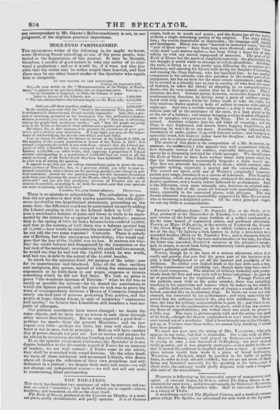POWER'S " military drama," St. Patrick's Eve, or the Order
of th Day, produced at the Haymarket on Tuesday, is a very neat and pleasant version of the familiar stage incident of a soldier condemned to die for some breach of regimental orders, and pardoned afterwards. POWER, as Major O'Doglarty, in the service of Frederick the Second, "the Great King of Prussia," as he is called, violates a curfew' order of the day," by lighting a dark lantern to write a love-letter for a wounded brother officer on St. Patrick's Eve ; and is discovered by the King himself. Moved by the tears and entreaties of the lady, for whom the letter was intended, Frederick connives at the prisoner's escape; and, in return, is saved from being treacherously taken prisoner, by the Major's gallantry and address. POWER, though he is the hero of a serious adventure, takes it so coolly and quietly, that you feel the grave part of the business to be only a dark background to set off the humour and jocularity of the Irishman. No soldier ever looked death in the face with such a rosy, smiling countenance and twinkling eye, though many may have met it with equal composure. The mixture of military formality and promptitude made his free and easy style tell to better advantage : he gave an air of gracefulness to the regimental stiffness. Though POWER and the pathetic seem wide as the poles asunder, there was something touching in his expression and manner when he makes up his mind to die : and his half-serious, half-comic way of singing a snatch of an Irish ballad, sounded like an involuntary dirge. In short, we were not only amused, but interested by his performance ; and were somewhat surprised that the audience received the play with indifference. To be sure, the time for military sentimentalism is gone by ; and there is nothing dramatic in the construction of the piece, while it has the customary share of improbabilities; but withal there was much to please in a little way. The story is picturesquely told, and the acting was good of its kind,—though the dresses (announced as new) were the dingiest ever turned out of a wardrobe. Had it been brought out at the Olympic, got up as VESTRIS does these trifles, we cannot help thinking it would have been popular. We must not pass over the acting of Mrs. TAYLEURE ; who only appears in one scene, but that is inimitable. She is the wife of the Major's BaIman, (very well played by STatcimaso,) and comes in crying to take a last farewell of O'Dogherty : her grief seemed really genuine, yet it was properly grotesque—a nice point to hit—SO i that t moved the audience to laughter and tears at once. A commonplace actress would have made it a piece of broad buffoonery. WEusma, as Frederick, might be justified in his habit of pulling faces, in order to look old and crabbed ; but we are not aware of there being any historical necessity fur his speaking in his nose,—and if there were, the audience would gladly dispense with such a disagreeable trait of the resemblance.


























 Previous page
Previous page